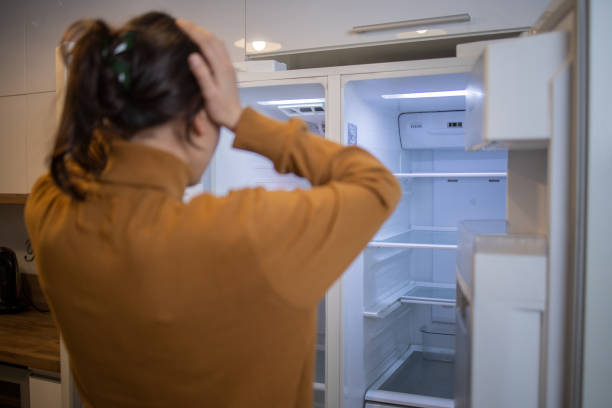A buzzing noise is one of the most common noises that a freezer can make. It can be caused by various factors, such as the fan motor, the evaporator fan, the condenser coils, the ice maker, or the compressor. Some of these noises are normal and harmless, while others may indicate a problem that needs to be fixed.
In this post, we will explain what causes a freezer to make a buzzing noise, how to troubleshoot it, and how to prevent it from happening again. By the end of this post, you will be able to solve the mystery behind the buzzing freezer and enjoy a more silent and efficient appliance.
What Causes a Freezer to Make a Buzzing Noise?
A freezer can make a buzzing noise for different reasons, depending on its type, model, age, and condition. Here are some of the most common causes of a buzzing noise in a freezer:
- Faulty fan motor – The fan motor is the part that powers the fan that circulates air inside the freezer. If the fan motor is faulty, it can make a buzzing noise due to lack of lubrication, electrical issues, or dirt accumulation. A faulty fan motor can also affect the cooling performance and efficiency of the freezer.
- Damaged evaporator fan – The evaporator fan is the part that blows air over the evaporator coils that cool the air inside the freezer. If the evaporator fan is damaged, it can make a buzzing noise due to ice or frost buildup, bent or loose blades, or worn-out bearings. A damaged evaporator fan can also cause uneven cooling and frost problems in the freezer.
- Dirty condenser coils – The condenser coils are the part that release heat from the refrigerant that cools the air inside the freezer. If the condenser coils are dirty, they can make a buzzing noise due to reduced airflow, overheating, or vibration. Dirty condenser coils can also cause higher energy consumption and lower cooling efficiency in the freezer.
- Malfunctioning ice maker – The ice maker is the part that produces ice cubes or crushed ice in some freezers. If the ice maker is malfunctioning, it can make a buzzing noise due to water valve issues, ice jamming, or motor failure. A malfunctioning ice maker can also cause water leakage and ice quality issues in the freezer.
- Defective compressor – The compressor is the part that compresses and pumps the refrigerant that cools the air inside the freezer. If the compressor is defective, it can make a buzzing noise due to electrical problems, refrigerant leaks, or internal damage. A defective compressor can also cause poor cooling and high energy bills in the freezer.

How to Troubleshoot a Buzzing Freezer?
If your freezer is making a buzzing noise, you should not ignore it or hope that it will go away on its own. A buzzing noise can indicate a minor or major problem that needs to be addressed as soon as possible. Here are some steps you can take to troubleshoot a buzzing freezer:
- Check the position and level of the freezer – Sometimes, a buzzing noise can be caused by an unbalanced or unstable position of the freezer. If your freezer is not placed on a flat and solid surface, it can vibrate and make noise when running. To fix this, you should adjust the feet or legs of the freezer until it is level and stable. You should also leave some space around the freezer for proper ventilation and airflow.
- Clean the condenser coils – Sometimes, a buzzing noise can be caused by dirty condenser coils that restrict airflow and cause overheating. To fix this, you should unplug the freezer and locate the condenser coils at the back or bottom of the unit. You should then use a vacuum cleaner or a brush to remove any dust or debris from the coils. You should also check for any signs of damage or corrosion on the coils and replace them if necessary.
- Inspect the evaporator fan – Sometimes, a buzzing noise can be caused by a damaged evaporator fan that hits ice or frost buildup on the evaporator. To fix this, you should unplug the freezer and open the back panel to access the evaporator fan. You should then check for any signs of ice or frost on the fan blades or around the evaporator and clear them if needed. You should also check for any signs of damage or wear on the fan blades or motor and replace them if necessary.
- Test the fan motor – Sometimes, a buzzing noise can be caused by a faulty fan motor that makes noise due to lack of lubrication, electrical issues, or dirt accumulation. To fix this, you should unplug the freezer and locate the fan motor at the back or bottom of the unit. You should then use a multimeter to test the resistance and continuity of the motor and its wires. If the motor or its wires show any signs of damage or failure, you should replace them as soon as possible.
- Examine the ice maker – Sometimes, a buzzing noise can be caused by a malfunctioning ice maker that makes noise due to water valve issues, ice jamming, or motor failure. To fix this, you should unplug the freezer and locate the ice maker inside the freezer compartment. You should then check for any signs of water leakage, ice buildup, or damage on the ice maker and its components. If the ice maker or its components show any signs of damage or failure, you should replace them as soon as possible.
- Check the compressor – Sometimes, a buzzing noise can be caused by a defective compressor that makes noise due to electrical problems, refrigerant leaks, or internal damage. To fix this, you should unplug the freezer and locate the compressor at the back or bottom of the unit. You should then listen for any abnormal sounds or vibrations from the compressor and check for any signs of oil leakage, corrosion, or damage on the compressor and its components. If the compressor or its components show any signs of damage or failure, you should contact a professional technician to repair or replace them as soon as possible.

How to Prevent a Buzzing Freezer?
The best way to prevent a buzzing freezer is to maintain it regularly and properly. Here are some tips you can follow to prevent a buzzing freezer:
- Clean the condenser coils at least once a year – Cleaning the condenser coils regularly can help prevent dust and debris from accumulating and restricting airflow and causing overheating and noise. You can use a vacuum cleaner or a brush to remove any dust or debris from the coils and check for any signs of damage or corrosion.
- Defrost the freezer periodically – Defrosting the freezer periodically can help prevent ice or frost buildup on the evaporator fan or around the evaporator that can cause noise and affect cooling performance. You can defrost the freezer manually by turning it off and letting the ice melt naturally or using a hairdryer to speed up the process. You can also use a freezer that has an automatic defrost feature that defrosts itself regularly.
- Lubricate the fan motor occasionally – Lubricating the fan motor occasionally can help prevent noise due to lack of lubrication that can cause friction and wear on the motor. You can use a few drops of light oil to lubricate the motor shaft and bearings and check for any signs of damage or wear.
- Check the water supply and filter for the ice maker regularly – Checking the water supply and filter for the ice maker regularly can help prevent noise due to water valve issues, ice jamming, or motor failure. You can make sure that the water supply is adequate and not leaking and that the water filter is clean and not clogged. You can also check for any signs of damage or wear on the ice maker and its components.
- Monitor the temperature and power supply of the freezer constantly – Monitoring the temperature and power supply of the freezer constantly can help prevent noise due to electrical problems, refrigerant leaks, or internal damage. You can make sure that the temperature is set at 0°F or lower and that there are no fluctuations or surges in the power supply. You can also check for any signs of oil leakage, corrosion, or damage on the compressor and its components.

Conclusion
A buzzing freezer is not something you should ignore or tolerate. A buzzing noise can indicate a minor or major problem that needs to be fixed as soon as possible. A buzzing noise can also affect your comfort and peace of mind.
In this post, we have explained what causes a freezer to make a buzzing noise, how to troubleshoot it, and how to prevent it from happening again. We hope this post has helped you solve the mystery behind the buzzing freezer and enjoy a more silent and efficient appliance.




